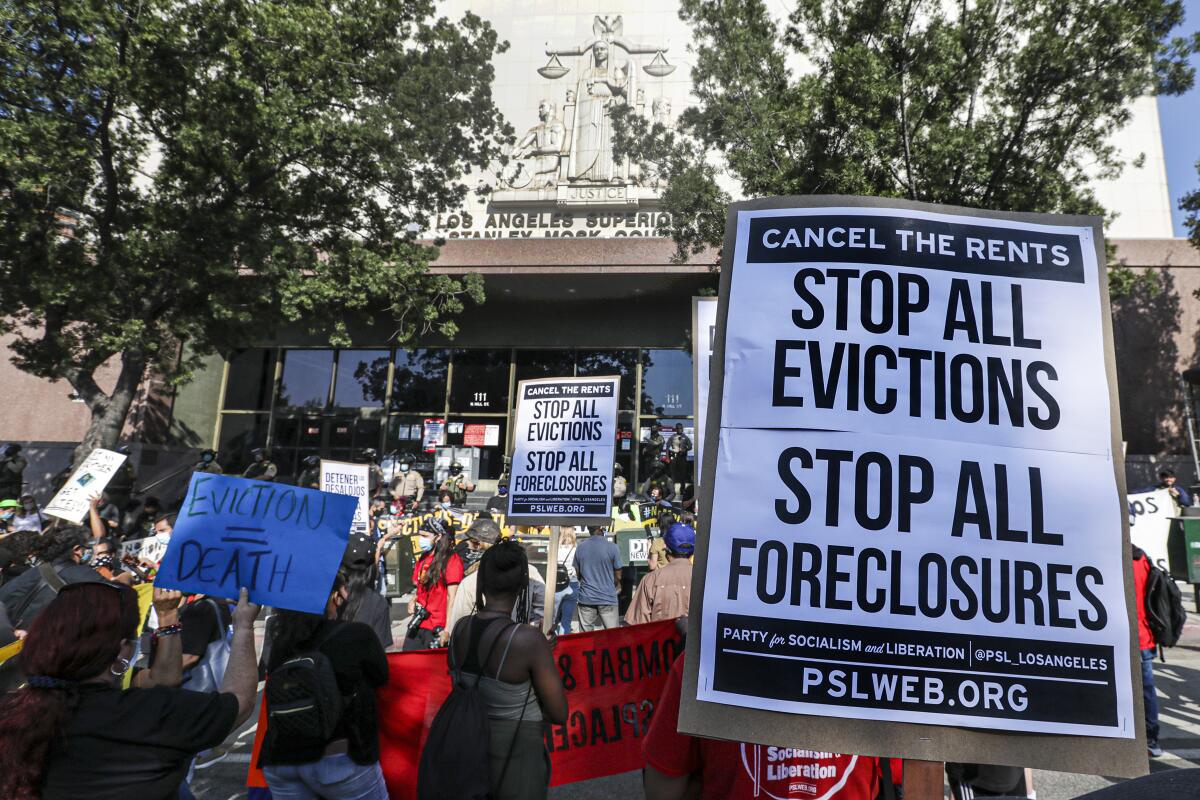Editorial: Tenant protections are homeless prevention

- Share via
At the tenant clinics hosted by the Alliance of Californians for Community Empowerment Action, about 90% of renters who show up seeking help say they’re being harassed by their landlords.
Their stories have a familiar refrain, advocates say. A new owner buys a rent-controlled building and wants to clear out the existing tenants in order to raise the rents. Sometimes the property management company offers cash to get longtime tenants to move out, but the offer is accompanied by intimidation or retaliation. Rent checks are refused. Needed repairs ignored. Baseless eviction cases are filed.
It’s a concerted campaign to get tenants to move out. These actions are often illegal, but there’s little enforcement. Tenants can try to sue their landlord for harassment, but there are a limited number of legal aid lawyers available. Plus, the penalties for harassment are so low that it can be hard to find an attorney willing to take the case.
Now, after four years of discussion, Los Angeles is close to adopting a tenant anti-harassment law that — if it’s not watered down in the final weeks — could deliver stiff penalties for landlords caught abusing their tenants. The proposal outlines various tactics that would be considered harassment, including threatening a tenant with physical harm, failing to make necessary repairs in a timely fashion, refusing to accept rent payments and threatening to report a tenant’s immigration status.
The proposed law would allow the city to cite harassing landlords or charge them with a misdemeanor punishable by up to six months in jail and a $1,000 fine. Tenants could also sue their landlord for harassment, with civil penalties up to $10,000 per violation, or $15,000 per violation affecting elderly or disabled tenants.
Councilwoman Nithya Raman has proposed amendments to strengthen the law, including blocking a landlord from raising the rent after harassing tenants out of the unit. That’s a no-brainer. Steep penalties are essential to deter bad actors who use harassment as a business model.
The L.A. ordinance is modeled after laws in Santa Monica, West Hollywood and San Francisco. Like Los Angeles, those rent-control cities had unscrupulous landlords trying to push out longtime tenants paying below-market rents. Low-income renters, seniors and disabled tenants were at particular risk — if they lost their home, they would have a hard time finding another low-priced unit amid a shortage of affordable housing.
There’s a growing recognition that protecting renters from unjust evictions could prevent more people from becoming homeless. Los Angeles County has housed a record number of homeless people in recent years, but more people fall into homelessness because of economic conditions, the lack of affordable housing and, yes, tenants displaced by harassment and evictions.
But an anti-harassment ordinance alone is not sufficient. The city does not have the personnel to investigate all harassment complaints, so it will be up to tenants to take their landlords to court. That’s a big challenge. Housing and eviction laws are notoriously difficult to navigate, so the process is heavily tilted in favor of those who have attorneys. In the vast majority of cases, landlords have lawyers and tenants do not.
That’s why tenant protections have to be coupled with expanded legal support for renters.
Last year, Los Angeles city and county voted to spend nearly $20 million on tenant education and legal aid. A proposed bill by Assemblyman Jesse Gabriel (D-Encino) would go further by creating a Homelessness Prevention Fund to pay for tenant outreach and legal services statewide. The program would fund attorneys to help tenants fight wrongful evictions, as well as provide education and advice on tenant-landlord disputes before eviction papers are filed.
That sort of early intervention is important. It can help tenants understand their obligations and discourage scofflaw landlords from ignoring tenant protection laws. That can lead parties to reach settlements without tying up courtrooms.
Gabriel and supporters are hoping to obtain $200 million for the fund from the state budget. They note that federal COVID-19 money can be used for tenant legal aid — which is important because the state’s pandemic-related rent relief program has loopholes that could leave some tenants with crippling rent debt if they don’t have legal assistance to navigate the process.
Landlord groups have opposed the anti-harassment ordinance and the Gabriel bill, with many worried they’ll be targeted for unfounded complaints and frivolous lawsuits. The focus of the anti-harassment ordinance, however, is unethical property owners who flagrantly break the laws that honest landlords follow. And funding legal aid would give tenants a level playing field on which to defend their rights. As long as affordable housing is scarce and there are landlords harassing tenants into vacating, these are the sorts of protections the city and the state require.
More to Read
A cure for the common opinion
Get thought-provoking perspectives with our weekly newsletter.
You may occasionally receive promotional content from the Los Angeles Times.










